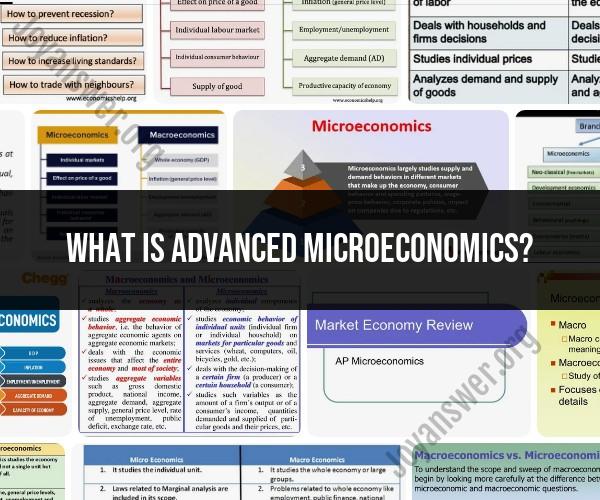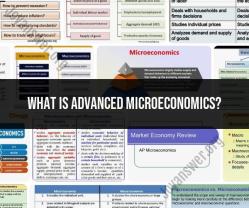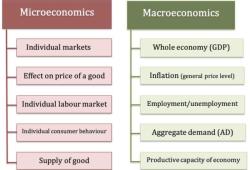What is advanced microeconomics?
Advanced microeconomics refers to a higher-level and more sophisticated study of microeconomic principles, theories, and models. Microeconomics is a branch of economics that focuses on the behavior of individual economic agents, such as consumers, firms, and markets, and how their interactions determine prices and resource allocation in a specific economic system.
In an advanced microeconomics course, students typically delve deeper into complex topics and advanced analytical methods. Here are some key elements often covered in advanced microeconomics:
Game Theory: Advanced microeconomics often includes an in-depth study of game theory, which analyzes strategic interactions among rational decision-makers. Game theory is applied to various economic scenarios, such as oligopolies, bargaining, and cooperation.
General Equilibrium Analysis: This involves studying the simultaneous interactions of multiple markets and how they reach a state of equilibrium. General equilibrium models can provide a more comprehensive understanding of how changes in one market can impact others.
Asymmetric Information: The study of situations where one party has more information than the other is a common theme in advanced microeconomics. Topics include adverse selection, moral hazard, and signaling.
Uncertainty and Risk Analysis: Advanced microeconomics explores how individuals and firms make decisions under conditions of uncertainty. This includes the study of risk aversion, expected utility theory, and decision-making under different probability distributions.
Topics in Industrial Organization: This area covers the structure, behavior, and performance of industries and markets. Advanced microeconomics might explore issues related to market power, antitrust policy, and strategic behavior of firms.
Advanced Consumer and Producer Theory: Building on basic microeconomic concepts, advanced courses may explore more sophisticated models of consumer choice and firm behavior, including intertemporal decision-making and dynamic optimization.
Welfare Economics: Advanced microeconomics often includes a deeper exploration of welfare economics, which assesses economic policies and outcomes based on their impact on societal welfare and efficiency.
Topics in Behavioral Economics: The study of how psychological factors influence economic decisions is increasingly incorporated into advanced microeconomics. Behavioral economics explores deviations from standard economic assumptions.
Advanced microeconomics courses are typically part of graduate-level programs in economics, and they are designed for students who have already completed introductory and intermediate microeconomics courses. These courses aim to equip students with the analytical tools and theoretical frameworks necessary for conducting advanced research in microeconomics or related fields.
What specialized topics are covered in advanced microeconomics courses?
Advanced microeconomics delves deeper into the theoretical underpinnings of economic behavior and analyzes complex interactions within markets. Here are some specialized topics often covered in these courses:
General Equilibrium Theory:
- Arrow-Debreu model: This formal framework examines the conditions for an efficient allocation of resources in a general equilibrium, where all markets simultaneously clear.
- Welfare theorems: These theorems link efficiency outcomes to competitive markets and social welfare.
- Pareto optimality: This condition describes when no individual can be made better off without making someone else worse off, highlighting potential trade-offs and distributional considerations.
Information Economics:
- Asymmetric information: This explores how unequal access to information between buyers and sellers affects market outcomes, leading to adverse selection, moral hazard, and signaling mechanisms.
- Auctions: Advanced models analyze different auction formats and their strategic implications for bidders and sellers.
- Game theory: This framework models strategic interactions between individuals or firms, helping analyze competition, cooperation, and bargaining situations.
Market Mechanisms and Design:
- Mechanism design: This field focuses on designing institutions and rules that incentivize optimal behavior and achieve desired outcomes in various economic settings.
- Matching markets: Topics include hospital-resident matching, school choice mechanisms, and other allocation problems with complex preferences.
- Taxation and public policy: Advanced courses analyze the economic effects of different tax policies, welfare programs, and other government interventions.
Behavioral and Experimental Economics:
- Bounded rationality: This departs from the assumption of perfectly rational actors and explores how cognitive limitations and heuristics influence economic decision-making.
- Behavioral experiments: Courses may introduce research methods from experimental economics, allowing students to analyze and interpret findings related to biases, fairness preferences, and other non-standard behavior.
- Market anomalies: Exploring deviations from traditional economic models, such as bubbles, crashes, and irrational exuberance, can be covered.
Industrial Organization:
- Market structure and firm behavior: Courses delve into different market structures (monopoly, oligopoly, competition) and analyze strategic interactions between firms, including pricing strategies, collusion, and entry barriers.
- Antitrust policy: Analyzing the rationale and effectiveness of antitrust policies aimed at regulating market power and promoting competition.
- Innovation and technological change: Advanced courses may explore the economic dynamics of technological progress, research and development, and intellectual property rights.
Beyond these, specific advanced microeconomics courses may cover additional topics like dynamic optimization, general equilibrium computation, information revelation mechanisms, resource economics, environmental economics, and more. The exact curriculum depends on the course title, professor, and institutional focus.
Remember, this is not an exhaustive list, and the specific topics covered will vary depending on the specific course you are considering. It's always a good idea to review the course syllabus or consult with the professor beforehand to get a clearer understanding of the content and expectations.
I hope this gives you a good overview of the specialized topics covered in advanced microeconomics courses! Let me know if you have any further questions about specific topics or want to explore certain areas in more detail.
Advanced microeconomics delves deeper into the theoretical underpinnings of economic behavior and analyzes complex interactions within markets. Here are some specialized topics often covered in these courses:
General Equilibrium Theory:
- Arrow-Debreu model: This formal framework examines the conditions for an efficient allocation of resources in a general equilibrium, where all markets simultaneously clear.
- Welfare theorems: These theorems link efficiency outcomes to competitive markets and social welfare.
- Pareto optimality: This condition describes when no individual can be made better off without making someone else worse off, highlighting potential trade-offs and distributional considerations.
Information Economics:
- Asymmetric information: This explores how unequal access to information between buyers and sellers affects market outcomes, leading to adverse selection, moral hazard, and signaling mechanisms.
- Auctions: Advanced models analyze different auction formats and their strategic implications for bidders and sellers.
- Game theory: This framework models strategic interactions between individuals or firms, helping analyze competition, cooperation, and bargaining situations.
Market Mechanisms and Design:
- Mechanism design: This field focuses on designing institutions and rules that incentivize optimal behavior and achieve desired outcomes in various economic settings.
- Matching markets: Topics include hospital-resident matching, school choice mechanisms, and other allocation problems with complex preferences.
- Taxation and public policy: Advanced courses analyze the economic effects of different tax policies, welfare programs, and other government interventions.
Behavioral and Experimental Economics:
- Bounded rationality: This departs from the assumption of perfectly rational actors and explores how cognitive limitations and heuristics influence economic decision-making.
- Behavioral experiments: Courses may introduce research methods from experimental economics, allowing students to analyze and interpret findings related to biases, fairness preferences, and other non-standard behavior.
- Market anomalies: Exploring deviations from traditional economic models, such as bubbles, crashes, and irrational exuberance, can be covered.
Industrial Organization:
- Market structure and firm behavior: Courses delve into different market structures (monopoly, oligopoly, competition) and analyze strategic interactions between firms, including pricing strategies, collusion, and entry barriers.
- Antitrust policy: Analyzing the rationale and effectiveness of antitrust policies aimed at regulating market power and promoting competition.
- Innovation and technological change: Advanced courses may explore the economic dynamics of technological progress, research and development, and intellectual property rights.
Beyond these, specific advanced microeconomics courses may cover additional topics like dynamic optimization, general equilibrium computation, information revelation mechanisms, resource economics, environmental economics, and more. The exact curriculum depends on the course title, professor, and institutional focus.
Remember, this is not an exhaustive list, and the specific topics covered will vary depending on the specific course you are considering. It's always a good idea to review the course syllabus or consult with the professor beforehand to get a clearer understanding of the content and expectations.
I hope this gives you a good overview of the specialized topics covered in advanced microeconomics courses! Let me know if you have any further questions about specific topics or want to explore certain areas in more detail.



